September 18, 2011
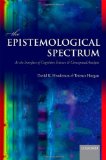
The Epistemological Spectrum: At the Interface of Cognitive Science and Conceptual Analysis by David Henderson and Terence Horgan (Oxford University Press, USA, 2011)
(amazon.co.uk)
Book description from the publisher:
David Henderson and Terence Horgan set out a broad new approach to epistemology, which they see as a mixed discipline, having both a priori and empirical elements. They defend the roles of a priori reflection and conceptual analysis in philosophy, but their revisionary account of these philosophical methods allows them a subtle but essential empirical dimension. They espouse a dual-perspective position which they call iceberg epistemology, respecting the important differences between epistemic processes that are consciously accessible and those that are not. Reflecting on epistemic justification, they introduce the notion of transglobal reliability as the mark of the cognitive processes that are suitable for humans. Which cognitive processes these are depends on contingent facts about human cognitive capacities, and these cannot be known a priori.
See also: Google Books preview
Comments (0)
- cognitive science,new books,philosophy of mind
September 17, 2011
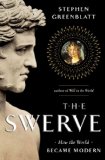
The Swerve: How the World Became Modern by Stephen Greenblatt (W.W. Norton, 2011)
(kindle ed. – Sep 26), (amazon.co.uk – 1 Sep)
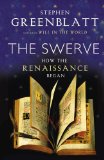
Product description from the publisher:
A riveting tale of the great cultural “swerve” known as the Renaissance.
One of the world’s most celebrated scholars, Stephen Greenblatt has crafted both an innovative work of history and a thrilling story of discovery, in which one manuscript, plucked from a thousand years of neglect, changed the course of human thought and made possible the world as we know it.
Nearly six hundred years ago, a short, genial, cannily alert man in his late thirties took a very old manuscript off a library shelf, saw with excitement what he had discovered, and ordered that it be copied. That book was the last surviving manuscript of an ancient Roman philosophical epic, On the Nature of Things, by Lucretius—a beautiful poem of the most dangerous ideas: that the universe functioned without the aid of gods, that religious fear was damaging to human life, and that matter was made up of very small particles in eternal motion, colliding and swerving in new directions.
The copying and translation of this ancient book-the greatest discovery of the greatest book-hunter of his age-fueled the Renaissance, inspiring artists such as Botticelli and thinkers such as Giordano Bruno; shaped the thought of Galileo and Freud, Darwin and Einstein; and had a revolutionary influence on writers such as Montaigne and Shakespeare and even Thomas Jefferson. 16 pages full-color illustrations
Comments (0)
- culture,new books
September 13, 2011
Today’s featured new release received a starred review from Kirkus Reviews:

The Thinking Life: How to Thrive in the Age of Distraction by P.M. Forni (St Martin’s Press, 2011)
(kindle ed.), (amazon.co.uk – 17 Oct)
Book description from the publisher:
Professor Forni, founder of The Civility Initiative at Johns Hopkins, is America’s civility expert. In his first two books, Choosing Civility and The Civility Solution, he taught readers the rules of civil behavior and ways of responding to rudeness. Now, in The Thinking Life, he looks at the importance of thinking in our lives: how we do it, why we don’t do enough of it and why we need to do more of it.
In twelve short chapters, he gives readers a remedy for the Age of Distraction, an age fuelled by the internet, Blackberries and cellphones, all of which make constant demands on our attention, diverting it from one thing to another. After suggesting ways we can find time to think more, Forni shows readers how we can improve our abilities of:
—Attention
—Reflection
—Introspection
—Self-control
—Positive thinking
—Proactive thinking
—Effective decision-making strategies
—Creative thinking
—Problem-solving strategies
Just as he did with civility, he puts the importance of good thinking front and center in a book as simple and as profound as his earlier works.
See also: Author’s website, Google Books preview
Comments (0)
- culture,mind,new books,psychology
September 12, 2011
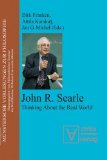
Thinking About the Real World by John R. Searle et al. (Ontos Verlag, 2011)
(amazon.co.uk – Oct 2010)
Book description from the publisher:
John R Searle is one of the world’s leading philosophers. During his long and outstanding career, he has made groundbreaking and lasting contributions to the philosophy of language, to the philosophy of mind, as well as to the nature, structure, and functioning of social reality. This volume documents the 13th Munster Lectures on Philosophy with John R Searle. It includes not only 11 critical papers on Searle’s philosophy and Searle’s replies to the papers, but also an original article by John R Searle on his overall philosophical enterprise entitled “The Basic Reality and the Human Reality”. “I think Munster is probably unique among contemporary universities in its ability to produce such a high level of philosophical production from their philosophy students.” (John R Searle).
See also: Review at Notre Dame Philosophical Reviews, UC Berkeley courses available through iTunes U – Fall 2011: Philosophy of Language, Philosophy of Society
Comments (0)
- culture,new books,reality
September 8, 2011
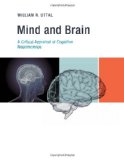
Mind and Brain: A Critical Appraisal of Cognitive Neuroscience by William R. Uttal (MIT Press, 2011)
(amazon.co.uk)
Book description from the publisher:
Cognitive neuroscience explores the relationship between our minds and our brains, most recently by drawing on brain imaging techniques to align neural mechanisms with psychological processes. In Mind and Brain, William Uttal offers a critical review of cognitive neuroscience, examining both its history and modern developments in the field. He pays particular attention to the role of brain imaging–especially functional magnetic resonance imaging (fMRI)–in studying the mind-brain relationship. He argues that, despite the explosive growth of this new mode of research, there has been more hyperbole than critical analysis of what experimental outcomes really mean. With Mind and Brain, Uttal attempts a synoptic synthesis of this substantial body of scientific literature.
After an introductory discussion, he turns to his main theme: what neuroscience and psychology have contributed to each other. He considers specific empirical findings in such fields as sensation, perception, emotion and affect, learning and memory, and consciousness. For each field, he considers psychological and behavioral concerns that can help guide the neuroscientific discussion; work done before the advent of imaging systems; and what brain imaging has brought to recent research. Cognitive neuroscience, Uttal argues, is truly both cognitive and neuroscientific. Both approaches are necessary and neither is sufficient to make sense of the greatest scientific issue of all: how the brain makes the mind.
Comments (0)
- cognitive science,mind,new books








